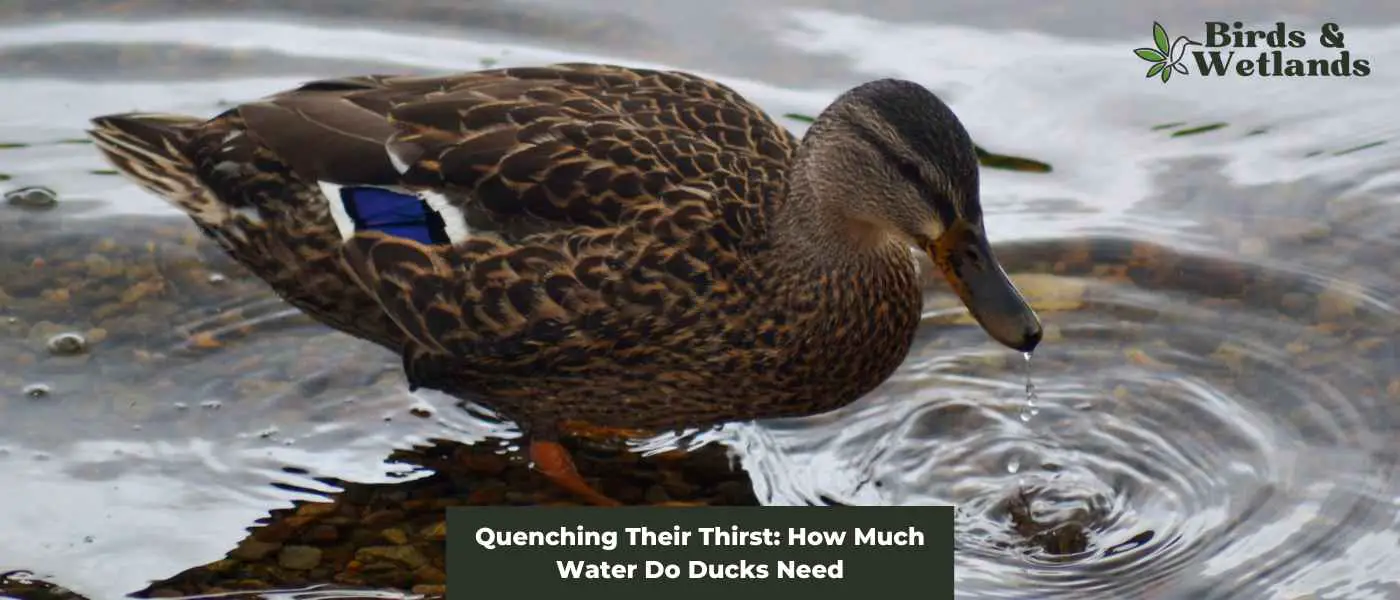Ducks are delightful creatures that make great pets and backyard livestock. They are friendly, social, and fun to watch. However, as with any animal, it is important to provide them with proper care and nutrition.
One of the essential requirements for ducks is water.
But how much water do ducks need?
Ducks need a constant supply of clean, fresh water for drinking, bathing, and maintaining their overall health. For drinking, provide a water container deep enough for them to fully submerge their bills. For bathing, ensure they have access to a shallow pond, pool, or large tub where they can clean their feathers and keep their skin healthy.
Key Takeaways:
Ducks require constant access to clean, fresh water for drinking and bathing
Drinking water containers should be deep enough for full bill submersion
Provide a shallow pond, pool, or tub for bathing to maintain feather and skin health
Why Ducks Need Water
Providing ducks with enough water is crucial for their overall health and well-being. Insufficient water can lead to dehydration, which can cause serious health problems and even death. Therefore, it is important to understand how much water ducks need and how to provide it to them properly.
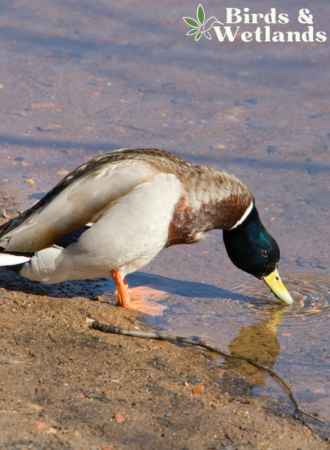
Drinking Water
Ducks need clean drinking water to swallow their food and feed properly. Adult ducks can drink up to a liter of water a day due to feeding habits. Without enough water, their food cannot be properly digested, leading to health problems. Therefore, it is important to ensure that ducks have access to clean and fresh drinking water at all times.
Swimming Water
Ducks also need water to swim and bathe in. Swimming helps ducks to keep their feathers clean and healthy. It also helps to regulate their body temperature. Ducks in such a scenario will suffer ill health effects and become emotionally distressed and exhibit anxious and even destructive behavior.
Ponds are ideal for ducks to swim and bathe in. If you have a pond, make sure it is at least 2 feet deep so your ducks can fully submerge their bodies and clean their feathers. A duck needs about two to four cups of water per day, depending on the temperature and humidity.
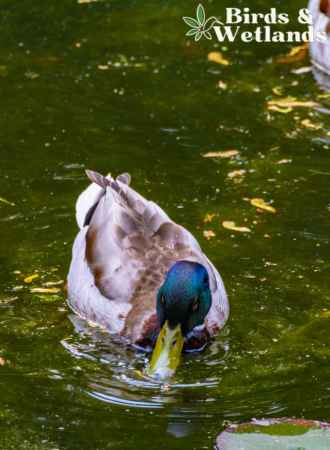
Water Access and Source
Water access is crucial to the health of ducks. In comparison to other poultry, ducks consume a lot of water and excrete a lot of water. In fact, their faeces can consist of up to 90 percent water, which poses obvious difficulties in terms of keeping their litter dry. Ducks need clean water to preen and bathe themselves.
It is important to provide ducks with adequate amounts of clean water daily to ensure they have enough water to drink and swim in. Ducks like to dig in the mud for worms but must have clean water to clean their bills and swallow their food. If a duck goes too long without water, it will die.
Water is essential to the survival of ducks. They need water to drink, swim, bathe, and regulate their body temperature. It is important to provide ducks with clean and fresh water at all times to ensure their health and well-being.
Best Water Feeder for Ducks
HydraQuench Poultry Drinker
Keep Your Ducks Hydrated & Happy!
Discover the secret to effortless hydration for your ducks with the HydraQuench Poultry Drinker, designed to quench your feathered friends’ thirst, rain or shine.

Pros
- Large 5-gallon capacity ensures a constant water supply for your ducks, minimizing refills and saving you time.
- Innovative float valve system maintains a consistent water level, reducing the risk of dehydration for your birds.
- Durable, UV-resistant plastic construction ensures a long-lasting, weather-resistant drinking solution.
- Easy-to-fill design with a removable lid simplifies refilling, cleaning, and maintaining the waterer.
- Versatile design is suitable for ducks, chickens, and other poultry, making it a one-stop hydration solution for your backyard farm.
Cons
- May not be suitable for smaller setups or those with limited space, due to its 5-gallon size.
- Some users have experienced issues with the float mechanism, which may require occasional maintenance or modification to prevent leaking and ensure consistent water flow.
Water Needs for Different Types of Ducks
Ducks are waterfowl, and as such, they require access to water for drinking, bathing, and swimming. The amount of water they need depends on several factors, including their age, breed, and living conditions. In this section, we will discuss the water needs of different types of ducks.
Adult Ducks
Adult ducks require a constant supply of clean drinking water to maintain good health. They also need access to water for bathing and preening their feathers. Ducks prefer to drink from modified cup drinkers or bell drinkers that are elevated off the ground to prevent contamination. Adult ducks typically consume about four cups of water per day, although this can vary depending on the temperature and humidity.
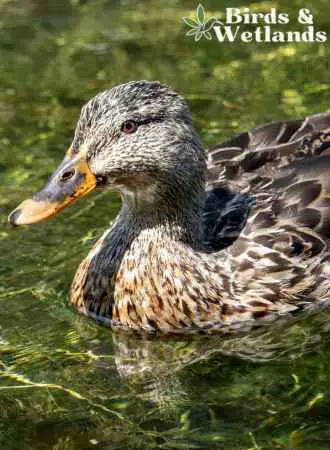
Baby Ducks
Baby ducks, also known as ducklings, require more water than adult ducks. They need water for drinking, bathing, and swimming to develop their muscles and maintain good health. Baby ducks should have access to water at all times, and the water should be shallow enough for them to stand in. A good rule of thumb is to provide one inch of water per week of age until they are fully feathered.
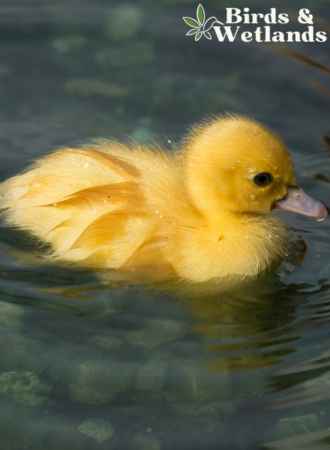
Domesticated Ducks
Domesticated ducks, such as Pekin ducks, have similar water needs to their wild counterparts. They require access to clean drinking water at all times and enjoy bathing and swimming. When raising domesticated ducks, it is important to provide them with a balanced diet and access to water to maintain good health.
Pekin Ducks
Pekin ducks are a popular breed of domesticated duck, known for their large size and white feathers. They require access to water for drinking, bathing, and swimming, and should have access to water at all times. Pekin ducks are often raised for meat production and require a balanced diet and plenty of water to grow and develop properly.
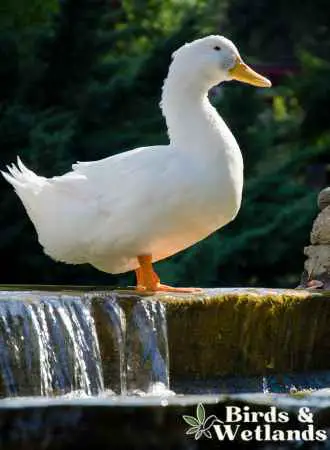
Older Ducks
Older ducks may have different water needs than younger ducks. As ducks age, they may require more water to maintain good health and stay hydrated. Older ducks may also benefit from free range or free ranging environments where they can access natural bodies of water for swimming and bathing.
| Age of Ducks | Water Requirements |
|---|---|
| 0-2 weeks | Shallow water for drinking (1/4 inch deep); clean and fresh water, changed regularly |
| 3-4 weeks | Shallow water for drinking (1/2 inch deep); clean and fresh water, changed regularly |
| 5-8 weeks | Deeper water for drinking (1 inch deep); clean and fresh water, changed regularly |
| 9 weeks – adult | Access to a pond, pool, or other water source for swimming and drinking; clean and fresh water, changed regularly |
Providing ducks with access to clean drinking water and water for bathing and swimming is essential for their health and well-being. By understanding the water needs of different types of ducks, you can ensure that your ducks are happy and healthy.
Providing Water for Ducks
Ducks require access to water for drinking, bathing, and playing. In order to keep them healthy and happy, it is important to provide them with clean water that is easily accessible. This section will cover the different types of water that ducks need and how to provide it for them.
Separate Drinking Water
Ducks need a separate source of clean drinking water that is free from contaminants. It is important to provide this water in a container that is deep enough for the ducks to submerge their bills. A good rule of thumb is to provide about two to four cups of water per day per duck, depending on the temperature and humidity.
Ducks drink about four cups of water a day, but they will splash and play in as much water as you give them! Be sure to provide several water tubs for your ducks. Large rubber tubs work better than gravity-fed waterers for ducks.
Playing Water
Ducks love to play in the water, and it is important to provide them with a safe and sanitary space to do so. A good metric for recreational water for ducks is around 20-24cm (8-9.5 inches) deep, which gives the duck plenty of space to submerge its body and head under the water.
A kiddie pool or baby pool can work well for this purpose. Ducks need to clean their bills quite frequently, both during eating and after, so providing them with a safe, sanitary space to do this is vital to their wellbeing.
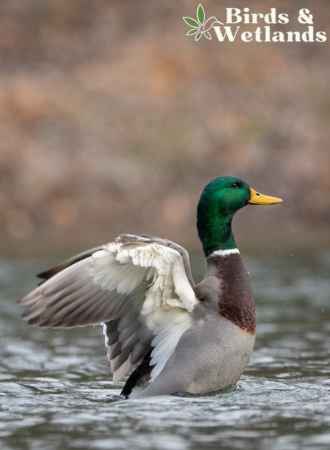
Dirty Water
Ducks are messy animals, and their water can quickly become dirty. It is important to change their water frequently to prevent the buildup of bacteria and algae. If you are keeping ducks with other farm animals, it is important to keep their water separate to prevent contamination.
Ducks also produce natural oils that can make their water oily and dirty, so it is important to clean their water containers regularly.
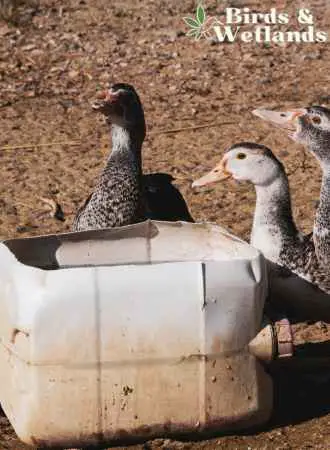
Best Overall Duck Feeder -FeatherEase Automatic Chicken Waterer & Feeder
Simplify Your Poultry Care with One Smart Solution!
Enhance your poultry care with the FeatherEase Automatic Chicken Waterer & Feeder, a convenient and efficient solution designed to keep your ducks and chickens well-fed and hydrated.

Pros
- Simplify your poultry care routine: Dual-function design combines an automatic waterer and feeder in one convenient unit.
- Save time and effort: Large feeder and waterer capacities reduce the need for frequent refill.
- Save money: Innovative no-waste feeding system minimizes feed spillage and waste.
- Long lasting: Food-grade, BPA-free materials ensure the safety and health of your poultry, while the durable constructio.
- Easy-to-assemble and maintain design simplifies the process of keeping your poultry hydrated and well-fed.
Cons
- Users with hard water may experience difficulty in separating the inner cup from the main cup of the waterer due to mineral buildup.
- The feeder’s holes may be too large for some users, allowing chickens to scatter food out, which could result in waste.
- The waterer may not function effectively in colder climates, requiring alternative solutions during the winter months.
Health Benefits of Water for Ducks
Ducks are waterfowl and require access to water to stay healthy. Water provides several health benefits to ducks. This section will explore the health benefits of water for ducks, including how it helps with fluffy feathers, duck’s health, and prevents health problems.
Fluffy Feathers
Water is essential for ducks to maintain their fluffy feathers. Ducks have a gland near their tail that secretes oil, which they spread over their feathers to make them waterproof.
Without access to water, ducks cannot preen their feathers effectively, which can lead to waterlogging and hypothermia. A shallow area of water where ducks can submerge their whole head is ideal for preening.
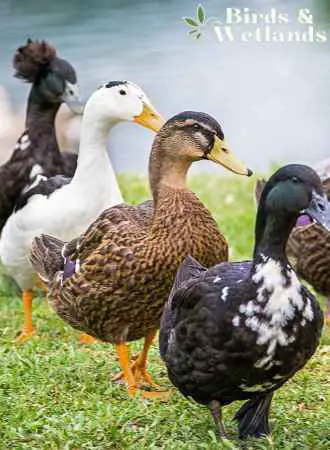
Duck’s Health
Water is also necessary for ducks to maintain their overall health. Ducks need water to digest their food properly, and they drink water to stay hydrated. Adult ducks can drink up to a liter of water a day due to their feeding habits.
Ducks also use water to regulate their body temperature during periods of heat stress, and access to open water is especially important for ducks farmed in tropical conditions.
Health Problems
Without access to water, ducks can develop several health problems. Dehydration is the most common problem, which can lead to a lack of appetite, lethargy, and weight loss.
Ducks that do not have access to water overnight can also develop respiratory problems, as they are unable to clean their nostrils and eyes. It is essential to provide ducks with fresh, clean water at all times to prevent these health problems.
Water is essential for ducks to stay healthy. Ducks need water to maintain their fluffy feathers, digest their food properly, and stay hydrated. Without access to water, ducks can develop several health problems, including dehydration and respiratory problems. It is crucial to provide ducks with fresh, clean water at all times to ensure they stay healthy.
FAQs on Do Ducks Need Water
Can ducks live without a pond?
Yes, ducks can live without a pond, but they still need access to water for drinking and bathing. Ducks prefer having a water source, such as a baby pool, to splash and play in, which is important for their health and well-being. Providing a shallow area in a duck pen or free-range area can also help keep ducks happy and healthy.
How much water do ducks drink a day?
Ducks drink quite a bit of water each day, typically around a liter or more depending on their size and activity level. It’s crucial to provide ducks with constant access to clean drinking water to maintain good health and prevent dehydration. Bell or modified cup drinkers can be used to ensure ducks have access to adequate amounts of water.
Do ducks need water every day?
Yes, ducks need water every day for drinking, bathing, and maintaining their fluffy feathers. Water is essential for a duck’s health, as it helps them stay hydrated, clean, and free of parasites. Ducks should have access to clean water at all times, and their water source should be refreshed regularly to ensure it stays clean.
Do ducks need water to swim in?
Ducks do not necessarily need water to swim in, but they enjoy swimming and playing in water. Providing a water source such as a pond, pool, or kiddie pools can help ducks stay entertained and maintain their natural oils, which are essential for waterproofing their feathers. Swimming also helps ducks maintain good health and reduces the risk of health problems related to stress or inactivity.
How often do ducks have to drink water?
Ducks need to drink water regularly throughout the day to stay healthy and hydrated. They should have access to clean water at all times, and their water source should be replenished as needed to ensure it stays fresh and clean. Ducks will drink more water in hot weather or when they are free-ranging and more active, so it’s essential to monitor their water consumption and adjust as needed. Using a fountain keeps water clean and hygienic.
How long can ducklings go without water?
During the first few weeks of their life, ducklings need constant access to water to stay hydrated, as they are not yet swimming in water to help maintain their hydration levels. At two weeks going more than three hours without access to water may be deadly for ducklings. It is essential to provide them with clean, fresh water at all times to ensure their health and well-being.

